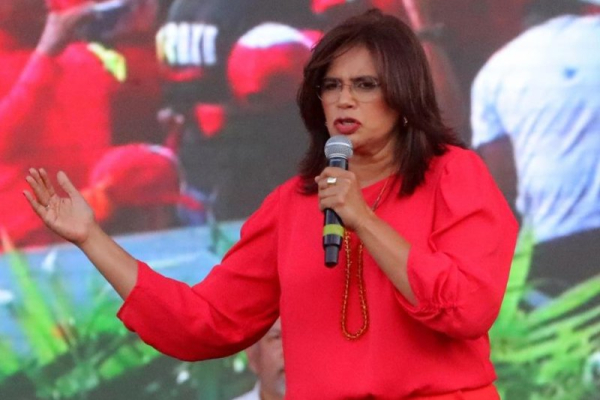

Presidential candidate for the Liberty and Refoundation Party (Libre), Rixi Moncada, speaks during a political rally in Tegucigalpa, Honduras, on Sunday. She has not signed a democratic commitment agreement to ensure transparency and respect for the results of the general elections Nov. 30.. Photo by Gustavo Amador/EPA
The main presidential candidates in Honduras signed a democratic commitment agreement to ensure transparency and respect for the results of the general elections scheduled Nov. 30.
The initiative, promoted by the National Electoral Council and supported by the Organization of American States, seeks to ease political tensions after President Xiomara Castro alleged an “electoral coup” attempt by opposition groups, El Heraldo reported.
During the ceremony held in Tegucigalpa on Tuesday, presidential hopefuls from the Libre, National and Liberal parties pledged to respect the popular will, avoid hate speech and recognize the official results issued by the electoral council.
Castro hailed the signing as “a necessary step to defend democracy,” while the opposition called for “real guarantees” of institutional impartiality.
However, Rixi Moncada, a former minister under Castro and the ruling party’s candidate, declined to participate in the agreement.
The pact also provides for international observation missions and improvements to the preliminary results transmission system, which has long drawn criticism for vulnerabilities.
With less than three weeks before the general elections, Honduras faces a tense political climate. Public distrust, competing allegations of fraud and concerns about military involvement have fueled uncertainty over the transparency of the electoral process.
The international community, led by the OAS and the European Union, has raised concerns about the lack of basic safeguards and urged respect for the constitutional framework.
According to the Center for the Study of Democracy, Hondurans show high levels of distrust in the electoral process. Turnout in the primaries fell below 43%, and the campaign has been marked by personal attacks, misinformation and limited policy debate.
Among the problems complicating the electoral landscape is that the electoral council has faced delays in awarding key contracts, including those for transporting election materials and providing technology kits for polling stations nationwide.
The company Unión Latin Cargo, the sole bidder in the tender process, withdrew in early November, citing a lack of logistical, contractual and security guarantees.
“For these reasons, along with other factors, we have been forced to withdraw from the process, as the established deadlines are not being met and we do not have the necessary guarantees or the adequate time to carry out the project correctly, efficiently and safely,” said María Lourdes Lagoz, the company’s general manager.
Adding to the difficulties are the absence of logistical drills to test the proper functioning of the preliminary results transmission system, lack of training for electoral custodians and failure to accredit national observers, creating a gap in citizen oversight.
Another controversy arose in late October, when leaked audio recordings linked members of the National Party, retired military officers and an electoral council official to an alleged plan to manipulate the results.
Castro denounced the incident as a conspiracy involving an electoral council official, a National Party lawmaker and a pastor to “alter the popular will” and favor conservative sectors that she said have sought to maintain political control of the country since the 2009 coup.
Castro called the case a direct threat to Honduran democracy and asked the armed forces to ensure transparency in the electoral process. The military requested access to the voting records and proposed transferring them to military bases for safekeeping — a move Transparency International and other monitoring groups described as “interference.”
Recent polls show a technical tie among three of the five presidential candidates, raising the risk of disputes and post-election conflict.
Along with the presidential race, voters on Nov. 30 will elect 128 lawmakers, 298 mayors and 20 representatives to the Central American Parliament.